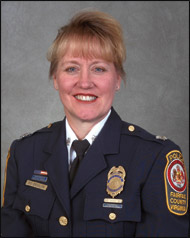
Suzanne Grabe Devlin
Into the Fray
Devlin makes the very best of conflicted situations
Suzanne Grabe Devlin, BA Sociology '82 and MS Conflict Management '85, liked the sound of the job: active, outside, working with people, problem solving, and for double the salary she was making. So when the Fairfax County Police Department opened its doors to women in the 1970s, Devlin was among the first women brought on board. “It seemed like a good thing to do. I didn't ever think I would be in it for 28 years,” she says. Now a lieutenant colonel in the department, Devlin has been named its acting chief—something else she never expected.
Devlin's journey to the department's top spot was not without its hurdles, though. As a former Marine, she was as prepared as anyone could be to handle the challenges created by women entering a male-dominated field. But 28 years ago, “the world of policing was adjusting to women in policing,” says Devlin. For example, the only uniforms available were men's—and that was just the beginning of issues that needed to be resolved.
“It wasn't that the organization wasn't welcoming, it was, but it was learning how to accommodate women,” Devlin says. And the challenges she and other women confronted early on not only came from within the department. “The outside community didn't know how to react to women in uniform as well. It was a constant education for people inside and outside.”
While on the job, Devlin returned to school at Northern Virginia Community College (NVCC) and then George Mason for her bachelor's degree in sociology. When Mason's new master's degree program in conflict resolution surfaced, she saw it fit her world. “Being a person of the 60s, painfully aware of Vietnam and peace and riots, most of us at that time believed there had to be another way to manage the world,” she says.
“I think my education has made me more sensitive to the fact that conflict is present in the environment, and it's a functional part of life and any organization,” Devlin says. “My studies certainly provided me with skills to more effectively manage workplace conflict and find the strength in conflict as a process of development.” The insight she gained from her studies enabled her to develop practical solutions for her own organization and for a career field that needed some help back then.
“It wasn't just women; it was the whole diversity thing,” Devlin says. The solution lay in frank discussion and developing a community among those who felt isolated from the larger organization and in coping with conflict within the organization, she explains. As a result, she created an employee dialogue program called EQUIP (Employee QUality Improvement Program) to bring officers' issues to a higher level in the bureaucracy.
Wherever she could, Devlin found a place to bring home what she learned. As a master's project in 1983, she organized the first conference for women in law enforcement, which addressed how women could cope with a difficult environment. The conference was later adopted by a presidential task force on women in federal law enforcement, which was set up under Jimmy Carter. Recently, Devlin was honored for years of work, begun as a student at the Institute for Conflict Analysis and Resolution, in bringing a student mediation program to the public schools and helping to develop the Pathways to Peace annual peer mediation conference.
“Conflict is a good thing, and you can make it work for you—if you deal with it,” she says. “We can only hope that in the next 10 years organizations will see a value to having the right kind of people helping others resolve conflict even at the simplest level and helping people confront difficult situations before they escalate.”
Devlin serves on board positions with the FBI National Academy Associates, the Virginia Chiefs Training Committee, the Work Force Investment Board, and the Northern Virginia Mediation Service. She also has been an adjunct instructor for 13 years teaching criminal justice first at NVCC and now at Mason. Devlin and her husband of 20 years have two daughters.
